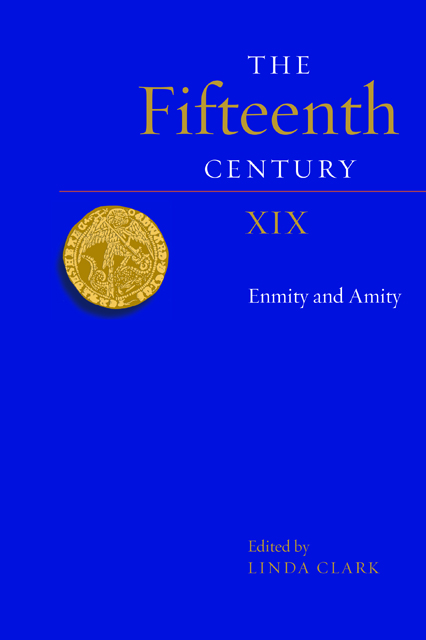Book contents
- Frontmatter
- Contents
- List of Contributors
- Preface
- List of Abbreviations
- England and Europe, c.1450–1520: Nostalgia or New Opportunities?
- Mariners and Marauders: A Case Study of Fowey during the Hundred Years’ War, c.1400–c.1453
- Henry V’s Army of 1417
- ‘Get out of our land, Englishmen’. French Reactions to the English Invasion of 1512–13
- Encountering the ‘Duche’ in Margery Kempe’s Lynn
- ‘C’est le Beaulté de Castille et d’Espaigne, qui le Soleil cler d’Austrice accompaigne’: Jean Molinet makes the Habsburgs Burgundian
- Magna Carta in the Late Middle Ages, c.1320–c.1520
- The Business of the Southern Convocation in 1462
- Index
- Contents of Previous Volumes
‘C’est le Beaulté de Castille et d’Espaigne, qui le Soleil cler d’Austrice accompaigne’: Jean Molinet makes the Habsburgs Burgundian
Published online by Cambridge University Press: 20 December 2022
- Frontmatter
- Contents
- List of Contributors
- Preface
- List of Abbreviations
- England and Europe, c.1450–1520: Nostalgia or New Opportunities?
- Mariners and Marauders: A Case Study of Fowey during the Hundred Years’ War, c.1400–c.1453
- Henry V’s Army of 1417
- ‘Get out of our land, Englishmen’. French Reactions to the English Invasion of 1512–13
- Encountering the ‘Duche’ in Margery Kempe’s Lynn
- ‘C’est le Beaulté de Castille et d’Espaigne, qui le Soleil cler d’Austrice accompaigne’: Jean Molinet makes the Habsburgs Burgundian
- Magna Carta in the Late Middle Ages, c.1320–c.1520
- The Business of the Southern Convocation in 1462
- Index
- Contents of Previous Volumes
Summary
Jean Molinet wrote three poems to celebrate the births of two children in the Habsburg family, Lienor (born in July 1498) and Charles (in February 1500), the eldest children of Philippe le Beau, duke of Burgundy. The three poems, La Nativité Madame Lienor, La Tres desirée et prouffitable naissance de Charles d’Austrice, and Sur la nativité Monseigneur le Duc Charles, form a series of three in the author’s Faictz et Dictz in the edition produced by Noël Dupire, but were not placed together in this way in the manuscripts on which the edition was based. Dupire’s decision to group Molinet’s poems by genre places this group of occasional poems in the same category, while the nature of occasional poetry makes their dating and arrangement in chronological order very straightforward, creating a series in the modern critical edition. Read together, the three poems present a view of Habsburg wealth depicting the new-born infants primarily as inheritors of Classical Antiquity, the Hebrew Bible and the Christian New Testament respectively. This wealth is not only cultural, but also territorial and linguistic, as the poet situates the birth of each child in the context of popular rejoicing in the lands ruled by her or his father. Molinet does this whilst using poetic strategies that are recognisably Burgundian to present continuity between the pre-1477 Valois regime and contemporary Habsburg rule. In so doing, he suggests that Habsburg government is a natural development for those territories and that the birth of these children represents a fulfilment of a divine plan that brings to an end the trauma of 1477.
At the time, the events of 1477 in the Burgundian Netherlands must have seemed to mark a cataclysm in the established political order of the region. From its origins in the gift of the duchy by Jean II, king of France, to his son Philippe in 1363, four generations of Valois dukes had, by conquest, marriage and good fortune, built a multilingual political unit that some commentators have regarded as a state. As well as the historical centre of the duchy around Dijon, the dukes of Burgundy controlled territory in the north, including Luxemburg and Brussels, and extending as far as Amsterdam. This meant that in some places their overlord – the ultimate source of authority in their lands – was not the king of France but the Holy Roman Emperor.
- Type
- Chapter
- Information
- The Fifteenth Century XIXEnmity and Amity, pp. 113 - 122Publisher: Boydell & BrewerPrint publication year: 2022



